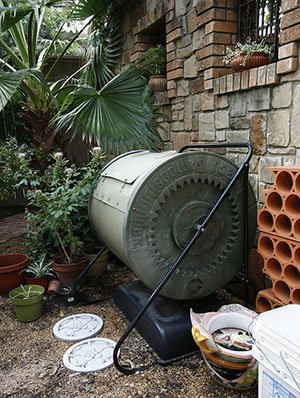Composting for the Home Gardener
Good, nutritious soil is the basis for any plant’s success. Unfortunately, what Florida gardeners have to work with is mostly sand.

This fine “sugar sand” doesn’t hold water or nutrients very well. But you can improve your soil with a host of Florida-friendly amendments, such as compost, manure or even worm castings.
Composting is a great way to turn kitchen scraps and yard waste into what gardeners call “black gold.”
Selecting a Site
Before you start composting, it’s important to pick a good site. Choose a spot that’s easy for you to get to, so that you’ll be inclined to add new material and to turn the compost on a regular basis. You might want to place your compost where it won’t stand out to your neighbors.
Also make sure that the hose can easily reach the site, since the compost needs to be moist for the magic to happen. If you use a covered bin, it will be easier for the pile to retain moisture during the hot but dry months in the early summer.
And speaking of summer, be sure to pick a shady spot if you don’t want to feel the heat while you’re tending the compost.
Compost Bins
A compost pile encourages the break-down of organic materials. The bin doesn’t need to be complicated to make and it can save you money.
The style of bin that is right for you depends on how much space and how much compostable material you have. There are many types of manufactured bins available through garden centers or mail-order catalogs, or you can build one yourself.
Homemade bins can be constructed out of wire fence material, wood, masonry or even recycled pallets. Check the internet for do-it-yourself instructions. Purchased units are often made of plastic and some are designed in a barrel fashion to allow the contents to be turned.
Starting Your Compost
Two types of materials are needed for successful composting: “green” materials, which are rich in nitrogen, and “brown” materials, which are rich in carbon.
Green materials include: plant-based kitchen scraps (vegetables and fruits), egg shells, farm animal manure, grass clippings, and young green plants, including some weeds.
Don’t add: meat, fish, fats, or dairy products. And while the manure of animals that eat plants (cows, horses, etc.) is a great “green” material, carnivorous animal waste (dogs, cats, etc.) should not be used due to the possibility of diseases. Avoid weeds that have set seed, and don’t add Florida betony or other weeds that can regrow from plant parts.
Brown materials include: fallen leaves, twigs and chipped branches, sawdust, shredded newspaper or cardboard, paper towels, tea bags, and coffee grounds.
The pile should be built in layers, each three to four inches deep. First lay down a “green” layer. Next, add a layer of “brown” materials. Then add another green layer. Sprinkle soil between all layers.
Moisten each layer as your build the pile, and turn your compost regularly to speed up the composting process. With little effort you can use the compost you produce to create a prosperous garden.
Compost Maintenance
Balanced compost has equal layers of “brown” materials, such as dead leaves, and “green” materials, like food scraps or grass clippings. To make compost fast, turn the pile frequently to add oxygen, and keep it moist. Compost should smell earthy, like a forest floor. Bad odors usually mean the compost pile is too wet or needs turning.
Your compost pile will work faster if you keep it moist and turn it often. Branches and twigs break down quicker if you run them through a chipper. The same is true for the waxy leaves of magnolias and live oaks. Make sure kitchen scraps are mixed into the center of the pile and covered with brown materials.
A new pile of compost will heat up rapidly. This is a reflection of the microbial activity. After 4-7 days, it will begin to cool; this is the time to mix the materials and allow the pile to heat again. You compost may even produce steam, but this is nothing to worry about.
Compost can be produced in roughly six weeks, if you occasionally turn the pile and keep it moist. Busy (and forgetful) gardeners should be happy to know that even if you don’t turn or water your pile, the materials will still decompose and become compost; it will just take much longer.
